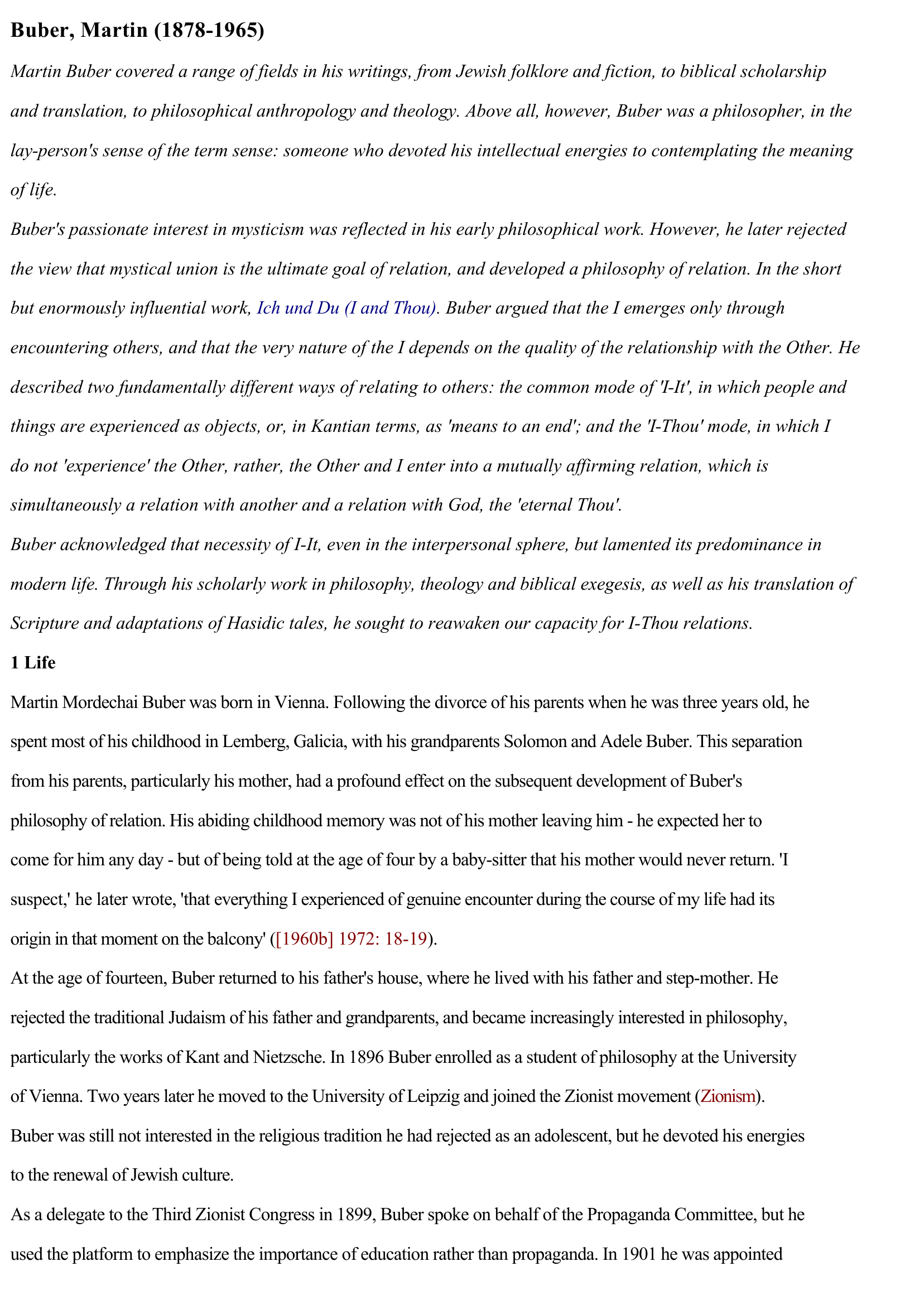Buber, Martin
Publié le 16/05/2020

Extrait du document
«
Buber, Martin (1878-1965)
Martin Buber covered a range of fields in his writings, from Jewish folklore and fiction, to biblical scholarship
and translation, to philosophical anthropology and theology.
Above all, however, Buber was a philosopher, in the
lay- person's sense of the term sense: someone who devoted his intellectual energies to contemplating the meaning
of life.
Buber's passionate interest in mysticism was reflected in his early philosophical work.
However, he later rejected
the view that mystical union is the ultimate goal of relation, and developed a philosophy of relation.
In the short
but enormously influential work, Ich und Du (I and Thou) .
Buber argued that the I emerges only through
encountering others, and that the very nature of the I depends on the quality of the relationship with the Other.
He
described two fundamentally different ways of relating to others: the common mode of 'I-It', in which people and
things are experienced as objects, or, in Kantian terms, as 'means to an end'; and the 'I-Thou' mode, in which I
do not 'experience' the Other, rather, the Other and I enter into a mutually affirming relation, which is
simultaneously a relation with another and a relation with God, the 'eternal Thou' .
Buber acknowledged that necessity of I-It, even in the interpersonal sphere, but lamented its predominance in
modern life.
Through his scholarly work in philosophy, theology and biblical exegesis, as well as his translation of
Scripture and adaptations of Hasidic tales, he sought to reawaken our capacity for I-Thou relations.
1 Life
Martin Mordechai Buber was born in Vienna.
Following the divorce of his parents when he was three years old, he
spent most of his childhood in Lemberg, Galicia, with his grandparents Solomon and Adele Buber.
This separation
from his parents, particularly his mother, had a profound effect on the subsequent development of Buber's
philosophy of relation.
His abiding childhood memory was not of his mother leaving him - he expected her to
come for him any day - but of being told at the age of four by a baby-sitter that his mother would never return.
'I
suspect, ' he later wrote, 'that everything I experienced of genuine encounter during the course of my life had its
origin in that moment on the balcony' ([1960b] 1972: 18-19 ).
At the age of fourteen, Buber returned to his father's house, where he lived with his father and step-mother.
He
rejected the traditional Judaism of his father and grandparents, and became increasingly interested in philosophy,
particularly the works of Kant and Nietzsche.
In 1896 Buber enrolled as a student of philosophy at the University
of Vienna.
Two years later he moved to the University of Leipzig and joined the Zionist movement ( Zionism ).
Buber was still not interested in the religious tradition he had rejected as an adolescent, but he devoted his energies
to the renewal of Jewish culture.
As a delegate to the Third Zionist Congress in 1899, Buber spoke on behalf of the Propaganda Committee, but he
used the platform to emphasize the importance of education rather than propaganda.
In 1901 he was appointed.
»
↓↓↓ APERÇU DU DOCUMENT ↓↓↓
Liens utiles
- Martin Buber
- Martin Buber (1878-1965)
- RAGING BULL de Martin Scorsese (1980) Noir & Blanc, 129 mn
- « La technique dans son être est quelque chose que l’homme de lui-même ne maîtrise pas » MARTIN HEIDEGGER
- Biographie Martin Luther King


